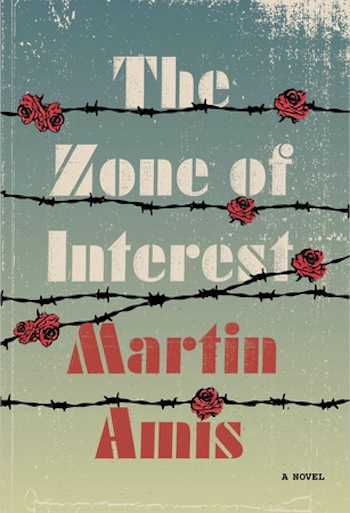Book Review: “The Zone of Interest” — Not Quite Interesting Enough
Martin Amis’s fiction, bleak though it often is, paradoxically remains compelling and pleasurable to read because of how well he writes about dreadful things.
The Zone of Interest by Martin Amis. Knopf, 320 pages, $26.95.
By Matt Hanson
It’s safe to say that Martin Amis has never shied away from controversial subjects. Over a long and noteworthy career, the eminent British novelist and essayist has consistently delved into prickly subjects like nuclear war, Thatcherite greed, terrorism, and Stalinist horror. One critic called Amis a harbinger of “the new unpleasantness.” Very few contemporary novelists can be as engaging and pleasurable to read while offering devastating indictments of the absurdities of modern life. Amis’s fiction, bleak though it often is, paradoxically remains compelling and pleasurable to read because of how exuberantly he writes about dreadful things.
It’s unfortunate that The Zone of Interest, his latest novel, consists of far more dread than beauty. At his strongest, in Money and London Fields, Amis writes compelling narratives about modern grotesquerie, relying on his technical excellence and caustic humor to carry the reader through tough terrain. Unfortunately, The Zone of Interest isn’t even close to his best work (it isn’t even mediocre) because its forbiddingly unpalatable subject matter overwhelms his ability to write about it compellingly. In attempting to dramatize the banality of evil, Amis ends up demonstrating the evil of banality.
The novel’s anti-hero protagonist is Angelus “Golo” Thomsen, nephew to Nazi Party Chancellery Martin Bormann. He has an authoritative but undefined position (“I liase”, as he puts it) at a concentration camp named Buna-Werke. The prisoners are used as cheap labor to produce synthetic rubber for IG Farben. Golo is attracted to Hannah, the wife of his particularly boorish camp commander Paul Doll. Golo plans to lull Hannah away from her dullard husband, partly because Hannah’s beauty and physical robustness makes her desirable and partly for the perennial appeal of shagging the boss’s wife.
Complex characterization has never really been Amis’s strong suit, and the motivation behind Golo’s desire for Hannah is scant at best. He falls for her at first sight simply because he is smitten with Hannah’s beauty and fired up by the surreptitious thrill of insubordinate adultery. Aside from his lust, Golo doesn’t have much going for him — aside from the sinister punctiliousness of a bureaucrat in a death camp. Sizing up the sturdily built Hannah, Golo bluntly remarks to himself that she would be “a big fuck.” The only zone of interest, for Golo at least, is found below his belt. That is not much to sustain interest in the narrative.
Worse, Golo is barely able to articulate what he feels either to Hannah or the reader. His target, for her part, despises her psychotic husband but feels nebulous at best towards Golo, which adds little to Zone‘s dramatic tension. Their story eventually leads to a denouement as underwhelming for the reader as it is for Golo.
Besides its grimly unsatisfying ‘romance,’ The Zone of Interest is a black-as-pitch parody of the pedestrian brutalities of shuffling around the paperwork and coordinating the schedules for the death trains. Different characters calculate the amount of labor that can be extracted from the prisoners in relation to calorie intake – Doll prefers numbers to words. The guards address each other as “dearest” and hold office meetings under a cloud of “cigarette smoke and existential unhappiness.” Doll gloats over the immanent German victory at Stalingrad, underlining this detachment from reality. A grisly and tasteless humor pops up from time to time. “Well, we’re not savages. At least we’re not eating them,” a camp commando cracks to Golo to cover up their mutual unease.
Amis’s decision to write about the Holocaust is risky, but it was not fated to fail. Novelists should be free to write about whatever subject they choose, however repugnant; the question is how well they write about it. Amis is ambitious, setting a literary challenge for himself and the reader, attempting to generate emotion and humor out of the least likely of scenarios, but this time around his talent doesn’t rise to the occasion. The ominousness of its premise crushes his attempts to supply either humanity or comedy.

Martin Amis — This time around he chose to handicap himself by rejecting his usual stylistic brio in favor of a language as gray and ugly as the landscape and the people it describes.
Of course , style can make up for a multitude of shortcomings. Amis’s prose has been celebrated for its acidic exuberance; his wicked satiric eye for human folly is matched only by the Nabokovian zest of his language. Unfortunately, none of his usual literary strengths are here. Sentences pass by with the zest of blips on a dim radar screen. It is understandable given the apocalyptic locale, but the prose in Zone is eerily compressed, flattened, numbed to the bone with omnipotent paralysis.
Henry James’s rule for fiction is that whatever it says or does, it must at least be interesting. (Ironically, Amis has already written a more successful novel dealing with the Holocaust, the Vonnegut-esque Time’s Arrow, which at least had the saving grace of being innovatively structured and briskly paced.) This time around Amis chose to handicap himself by rejecting his usual stylistic brio in favor of a language as gray and ugly as the landscape and the people it describes. The novel never recovers from this meticulous vision-in-concrete. The Zone of Interest is perversely peculiar — but that doesn’t make it interesting enough.
Matt Hanson is a critic for the Arts Fuse living outside Boston. His writing has appeared in The Millions, 3QuarksDaily and Flak Magazine (RIP), where he was a staff writer. He blogs about movies and culture for LoveMoneyClothes. His poetry chapbook was published by Rhinologic Press.


This is a sweet, brisk takedown of an author who’s become too much of a sacred cow. Mazel tov!